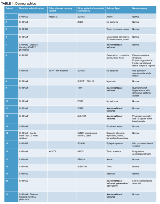Epilepsy and Neuronal Nicotinic Acetylcholine Receptor Gene Variants – Is Nicotine a Precision Therapy?
Abstract number :
1.230
Submission category :
4. Clinical Epilepsy / 4C. Clinical Treatments
Year :
2018
Submission ID :
500492
Source :
www.aesnet.org
Presentation date :
12/1/2018 6:00:00 PM
Published date :
Nov 5, 2018, 18:00 PM
Authors :
Jordana Fox, Children's Medical Center UT Southwestern; Drew Thodeson, Children's Medical Center UT Southwestern; and Alison Dolce, Children's Medical Center UT Southwestern
Rationale: Autosomal dominant nocturnal frontal lobe epilepsy (ADNFLE) can be caused by gene variants in subunits of the neuronal nicotinic acetylcholine receptor (nAChR), specifically, cholinergic receptor nicotinic subunits alpha 4, alpha 2, and beta 2 (CHRNA4, CHRNA2, and CHRNB2). Approximately 30% of patients with ADNFLE are refractory to conventional anti-seizure medications (2). Gene variants in nAChRs in pre-clinical models cause a gain of function mutation leading to increased sensitivity to acetylcholine. Nicotine modifies activity of nAChRs (3), thus nicotine patches have been suggested as a treatment strategy in refractory cases of ADNFLE (4). We performed a retrospective analysis of identified nAChR variants identified at our tertiary care center. Methods: We reviewed next generation sequencing epilepsy panels performed at a single laboratory (GeneDx) from patients seen at Children’s Medical Center Dallas between 2011-2015. We identified patients with nAChR gene variants (CHNRA4, CHNRA2, CHRNB2, and CHRNA7). Medical and laboratory records were systematically reviewed including genetic variant details, medical history, neuroimaging findings, and treatment history. We sought to correlate patients’ phenotype and genotype specifically focusing on treatment trial effects of nicotine patch. The study was conducted with approval of institutional IRB. Results: Twenty-one patients were identified. Specific gene variants, neuroimaging findings, and seizure types for each patient are detailed in Table 1. Four patients were trialed on nicotine patches (Table 2). Three of the four patients had good clinical response with > 50% seizure reduction. One patient became seizure free and now on nicotine patches for monotherapy. One patient had no response after a one-month trial. Through our chart review, we identified four additional patients with exclusively nocturnal seizures (ADNFLE phenotype) that have not been treated with nicotine. Conclusions: We confirm that in select patients, treatment with a nicotine patch in the presence of nAChR gene variant can be an effective precision therapy for epilepsy (1). We propose consideration of this treatment in refractory patients with known cholinergic nicotinic receptor subunit variants especially those with clinical history consistent with ADNFLE. Further phenotype-genotype characterization in combination with preclinical studies will lead to better understanding of mechanisms of these complex gene variants with the ultimate goal to bring precision medicine to epilepsy. Funding: None

.tmb-.png?Culture=en&sfvrsn=25d5b5ba_0)